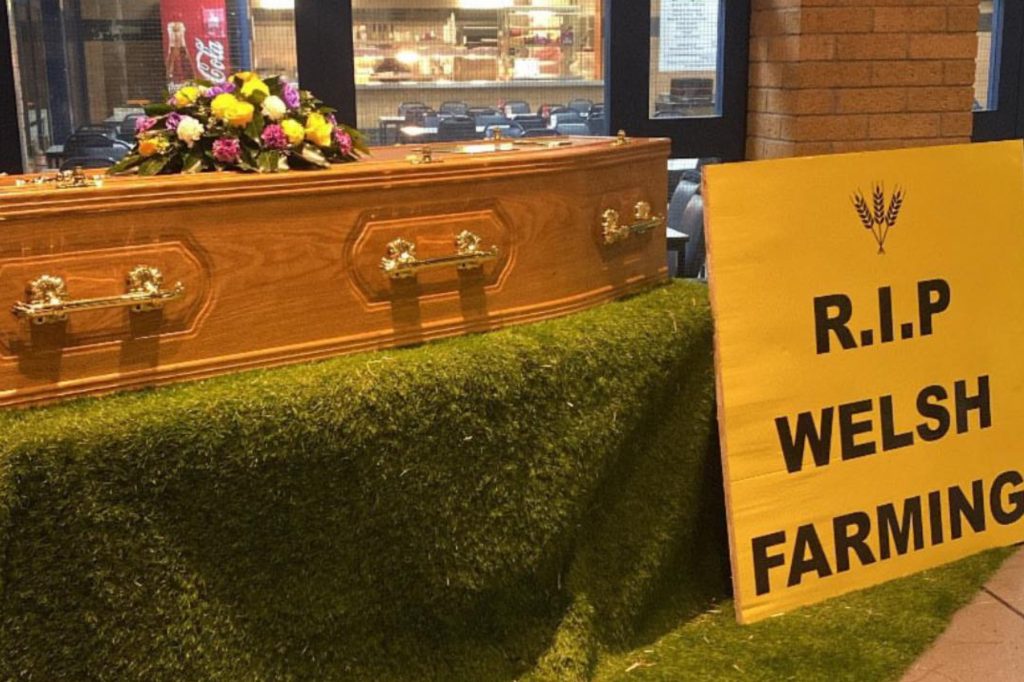APPROXIMATELY 3,000 Welsh farmers and their supporters converged at the Carmarthen showground in Nantyci this week (Feb 8), voicing their stern opposition against the planned reforms by the Welsh Government.
This significant gathering followed a similarly packed meeting in Welshpool last week, which saw over 1,000 attendees.
The protests have been ignited by the Welsh Government’s proposed changes to farming policies, aimed at encouraging “sustainable” agricultural practices. Under the new subsidy scheme, set to be implemented from 2025, farms would need to dedicate 10% of their land to tree planting and another 10% to wildlife habitats to qualify for payments. These measures are part of a broader effort to combat climate change and biodiversity loss.

However, the reforms have been met with widespread criticism from the farming community.
A mock coffin, bearing the inscription “In memory of Welsh farming,” was paraded by protestors at the demonstration, symbolising the perceived threat to the industry. Signs with messages like “RIP Welsh farming” and “no farmers, no food” were also prominently displayed, underscoring the deep concerns within the agricultural sector.
The Welsh Government has urged farmers to engage in the ongoing consultation process regarding the reforms, suggesting that changes to the plans could still be made. Despite this, the sentiment on the ground reflects a profound fear of the future, with many farmers feeling the new requirements would impose unmanageable burdens and significantly increase administrative work.
The farming industry’s leaders have not minced words, describing the current moment as a “crunch point” for Welsh agriculture. They argue that the scheme’s rigid requirements on tree and habitat creation, coupled with the lack of clear details on payment rates, will have disastrous effects on farm businesses. An impact assessment accompanying the consultation predicted a substantial reduction in livestock numbers and a potential loss of 5,500 jobs, further exacerbating the industry’s anxieties.
In response to the mounting pressure, the Welsh Government, represented by Rural Affairs Minister Lesley Griffiths, has acknowledged the sector’s concerns, emphasising the importance of the consultation process and suggesting that adjustments to the proposals are likely. The government insists that the Sustainable Farming Scheme (SFS) aims to ensure the long-term viability of Welsh farming, alongside environmental sustainability.
Nevertheless, the farming community remains skeptical. The current and final consultation period represents a critical juncture for Welsh farmers to express their concerns and potentially influence the future direction of agricultural policy in Wales. With a history of farming that runs deep in the Welsh countryside, the outcome of this dispute will undoubtedly have far-reaching implications for the region’s rural economy and way of life.
Samuel Kurtz MS, said on X: “Immensely proud and in awe of every farmer at Carmarthen Mart tonight. The sleeping dragon that is rural Wales is awakening after years of neglect by Labour.
“Fed up, frustrated but not taking a backward step.”
The Welsh Conservatives say that the Labour Government does not listen to Welsh farmers. “The farming community is understandably frustrated at being ignored for so long”, they said on social media.
WELSH FARMERS AT A CROSS ROADS
With just a month remaining in the final consultation period for the Sustainable Farming Scheme (SFS), agricultural leaders in Wales have sounded the alarm, declaring the sector at a critical juncture. The scheme, which has been under development following the Welsh Government’s commitment to sustainable agriculture, faces mounting scrutiny from the farming community. Concerns hinge on the government’s insistence on a 10% land allocation for both tree planting and habitat creation, with many in the sector calling for a reconsideration of these requirements amid fears of significant operational and financial impacts.
The Farmers’ Union of Wales (FUW) has been at the forefront of opposition, highlighting the scheme’s potential to cause a near 10.8% reduction in livestock numbers and an 11% decrease in agricultural labor, equating to an estimated £199 million loss in farm business income. FUW President Ian Rickman emphasised the urgency of the situation, urging all stakeholders to engage in the consultation process to advocate for necessary adjustments to the scheme.
Amidst this backdrop of concern, individual farmers like Tudur Parry, a dairy, beef, and sheep farmer from Caernarfon, express apprehension towards the SFS’s rigidity, particularly around land use for trees and habitats. Parry’s concerns reflect a broader sentiment that the scheme’s current form could undermine the viability of traditional farming operations in Wales.
The consultation process has also shed light on the anxiety permeating the farming community, with only a fraction of attendees at a recent FUW meeting indicating their willingness to participate in the SFS under its present conditions. This reluctance underscores the perceived incompatibility of the scheme with the Welsh farming community.


















